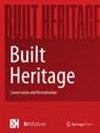Assessing the socio-cultural impact of urban revitalisation using Relative Positive Impact Index (RPII)
Q1 Arts and Humanities
引用次数: 0
Abstract
Urban heritage is a vital resource that connects communities to their local identity. Unplanned developments and rapid urbanisation often harm the authenticity of historic areas, disrupting the cultural fabric and altering their character. This study introduces the Relative Positive Impact Index (RPII), a novel technique for assessing the socio-cultural impacts of urban revitalisation. The significance of RPII lies in its ability to quantitatively evaluate the impacts on the cultural fabric and integrity of historic urban areas, which is crucial for sustainable urban development. The study’s objective is to apply RPII in evaluating qualitative socio-cultural characteristics in historic urban areas, with a focus on four main criteria and 16 sub-criteria, in the case of the Kuttichira precinct. The methodology integrates the analysis of published literature, a quantitative survey mapping the stakeholders’ perception, and qualitative insights. This approach facilitates an in-depth understanding of how urban revitalisation affects local socio-cultural dynamics, preserving the authenticity and character of historic areas. The study reveals that the revitalisation project in Kuttichira positively impacts the socio-cultural fabric of the area, maintaining cultural integrity and addressing social challenges. These findings offer valuable insights for sustainable urban development and policymaking in historic areas. The study recommends the application of RPII in other urban precincts for comparative analysis and further development of urban development practices, contributing to informed urban policy and planning decisions.利用相对积极影响指数(RPII)评估城市振兴的社会文化影响
城市遗产是连接社区与地方特性的重要资源。无规划的开发和快速的城市化往往会损害历史区域的真实性,破坏其文化结构并改变其特征。本研究引入了相对积极影响指数(RPII),这是一种评估城市振兴对社会文化影响的新技术。RPII 的意义在于它能够定量评估对历史城区文化结构和完整性的影响,这对城市的可持续发展至关重要。本研究的目标是应用 RPII 对历史城区的社会文化特征进行定性评估,以库提奇拉街区为例,重点关注 4 项主要标准和 16 项次级标准。该方法综合了对已出版文献的分析、对利益相关者看法的定量调查以及定性见解。这种方法有助于深入了解城市振兴如何影响当地的社会文化动态,以及如何保护历史区域的真实性和特色。研究表明,库蒂奇拉的振兴项目对该地区的社会文化结构产生了积极影响,既保持了文化完整性,又应对了社会挑战。这些发现为历史区域的可持续城市发展和政策制定提供了宝贵的见解。研究建议在其他城市地区应用 RPII 进行比较分析,并进一步发展城市发展实践,为知情的城市政策和规划决策做出贡献。
本文章由计算机程序翻译,如有差异,请以英文原文为准。
求助全文
约1分钟内获得全文
求助全文

 求助内容:
求助内容: 应助结果提醒方式:
应助结果提醒方式:


